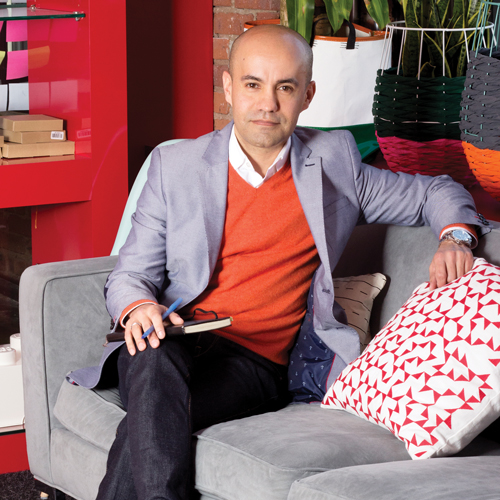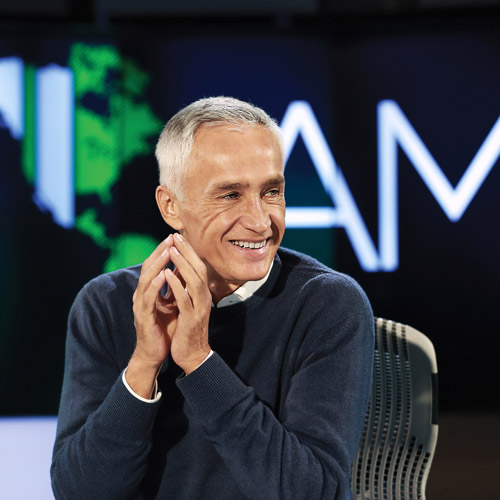Some might be surprised to hear that a French high-fashion brand synonymous with wealth and luxury is run by a Hispanic guy from San Antonio. But Robert Chavez considers the 177-year-old Hermès his second home and family.
While anxiously waiting for his first interview with Jean-Louis Dumas, Chavez hardly expected the distinguished fifth-generation CEO to break the ice by complimenting his Armani suit fabric. Dumas could have been intimidating, but Chavez was immediately put at ease. “We started talking about food, art, history, and just about anything and everything—except for my relevant work experience,” Chavez laughs. He took the reins of Hermès USA (Hermès of Paris, Inc.) and has been charting the course for the brand in America with a balance of classic and contemporary statements.
Fourteen years later, alongside global CEO Axel Dumas, the born-and-raised Texan insists that his real American family and the Hermès household have more similarities than differences. It may seem far-fetched that a family from San Antonio could be akin with a family whose net worth is in the vicinity of $2.2 billion, but Chavez begs to differ. “The Hermès family is very humble and caring,” he says. “It was built on the simple commitment to uncompromising quality and craftsmanship, which is why we are into the sixth-
generation of leadership and 170-plus years in business.”
Growing up as the son of two first-generation Latin American immigrants, Chavez lived a humble lifestyle. His father worked in the San Antonio Sheriff’s Department while his mother stayed at home with three sons. Chavez was the middle child. One distinct memory he takes away from his childhood is the impact his teachers had on him. “I still remember each one of my teachers’ names,” he says. “I look back now and appreciate the way they pushed me to reach my potential and beyond.” When Chavez was 17, his father passed away. Without his father at home, Chavez questioned whether he should leave his mother and go away to college. “It was a difficult decision, but my mother believed in me and my future.” With her support, he carried out his potential at Princeton University.
Despite having held high-ranking positions in fashion, such as CEO of Etienne Aigner and president of merchandising for R.H. Macy and Co., Chavez admits he started at the bottom of the retail totem pole. “You have to be willing to do pretty much anything. I had my experience working in the stock room,” Chavez says. After graduation he joined the executive training program for Bloomingdale’s in New York City, and unbeknown to him, would find his niche in retail.
It was at Bloomingdale’s that he was exposed to every department from ready-to-wear to beauty. Shortly after completing the program, he became the assistant buyer for the cosmetics department and worked his way up as a buyer in the home furnishings area. In 1986, Chavez acted as merchandise administrator for cosmetics and fragrance at Macy’s. A mere five years later he was promoted to president of merchandising. During his tenure with Etienne Aigner, he significantly increased the growth and profitability for the high-fashion house. In 2000, Chavez joined Hermès of Paris, Inc.
“Our challenge is to portray Hermès in a modern way without losing our heritage.”
Like an Hermès scarf adorning the neck of Grace Kelly, Chavez has proven he is a perfect pairing with the company. He describes himself as a “natural fit,” which isn’t an easy task for an establishment that is not just a company, it’s a culture.
It was Chavez who noticed how profitable the Hermès men’s market was in China and decided to bring the first American Hermès Boutique for Men to New York. Axel Dumas notes the United States has become a tremendous market the last several years. The first quarter numbers for 2014 revealed 16 percent of accounted sales were brought in by American stores.
In light of the US expansion, Chavez also brought Hermès’s celebrated All About Women event to the states on May 20, 2014. The night included an off-season women’s runway show held at the historic J.P. Morgan headquarters at 23 Wall Street. It was the third All About Women affair, having started in Shanghai, China in 2012 and continued in Paris in 2013. Guests were flown from around the world for a whimsical night with Hermès. Dumas and Chavez cohosted the 700-person event, which was conceived to celebrate everything in the “women’s universe” from bracelet watches to shoes, but also to prove that the luxury house can be both classic and contemporary. “Our challenge is to portray Hermès in a modern way without losing our heritage,” Chavez says. “It is an element we are always trying to work on.” Somewhere amid the fortune-tellers, synchronized dancers, and parade of men waving pom-poms, Hermès affirmed it can be daring and playful.
Off the cuff with Robert Chavez
The luxury magnate gives us a look at his casual side.
What is in your closet at the moment?
I have suits and a lot of Hermès ties, but my weekend wear is blue jeans and tee shirts. One has to escape from the business world.
What do you enjoy doing in your free time?
My favorite thing to do is travel for pleasure with my husband. We travel whenever we can. There are so many wonderful places we have been, and there are so many places that we want to discover. For our next trip we’re looking at Peru, Indonesia, or Scandinavia.
What Hermès item would you splurge on?
I was thinking it would be great to have a messenger bag that I could just bring into work on casual Friday, so I would want to splurge on an Hermès messenger bag. It would be really nice to use on the weekends.
What makes Hermès a perfect fit for you?
There is something whimsical about Hermès, and I have a certain whimsical side to me. There is a child-like, playful side of me that has never disappeared. I attribute that to my parents.
Alongside designer Christophe Lemaire’s ready-to-wear fall/winter 2014 collection were Hermès’s classic confections of silk scarves and bags. “Though Hermès consistently strives to be modern, we maintain the most important elements,” Chavez says. In this case, Chavez is not talking about the products themselves. The elements he is referring to are the core values of quality, consistency, creativity, and innovation that the company has preserved through the years. When it comes to quality of the product, the illustrious saddle stitch speaks for itself. It’s a dance between the needle, thread, and craftsman’s fingers that seems effortless, but can easily be done incorrectly without the proper technique.
The method has been used since Thierry Hermès founded the harness workshop in 1837. Although it is not as time-efficient as a machine, the saddle stitch (when done properly) will never come loose. The hands behind the stitch have years of saddle making and leather schooling before they are brought into the ateliers. As far as consistency goes, one will never see Hermès mass-producing. As a result, many customers spend years pining for certain items. For Hermès, it’s not about what will and will not sell, but about keeping the consistency and authenticity. The company continues to make everything in France, and refuses to outsource, even in a poor economy. These core values are the reason Hermès has become a major force in the luxury market.
When Chavez isn’t planning grandiose events like All About Women, he focuses on recruiting, retaining, and motivating his 650 employees. “Just like my school teachers motivated and inspired me, I try to push people to their potential. I manage everyone in the corporate office, retail, merchandising, HR, communications, and operations.” Chavez says having a solid staff allows all the other pieces of the puzzle to fall into place. Hermès of Paris, Inc. has had its lowest turnover during Chavez’s tenure. He is just one extension of the company’s effort to make its employees feel like part of the family. Another is the triannual “family reunion,” a three-day event that requires all US retail stores to lock their doors and close up shop for the team-building retreat.
Chavez takes on whatever task is thrown at him whether it falls under the CEO job description or not. “If I come in for a store visit, and I need to help a customer, answer a call, or work the floor, I don’t mind. Sometimes I’ll pick up the phone when associates are calling and they say, ‘Bob? Chavez?’ I’ts actually fun for me,” he says. On a larger scale, he spends his time continuing to expand the US market. There are 28 Hermès stores in the United States with flagships on Madison Avenue in New York and Rodeo Drive in Beverly Hills, CA.
As a veteran in the retail industry, Chavez knows that there is no such thing as an average day. “You need to be prepared for everything,” he says. This includes bad publicity. In 2005, an incident at an Hermès store in Paris sent the Internet into a frenzy after Oprah Winfrey was denied entrance to Hermès at closing time. Although the incident took place overseas, due to the global CEO’s deteriorating health, Chavez was chosen as the spokesperson to make a public apology on the Oprah Winfrey Show.
At the American Express Publishing Summit in April 2013, Chavez tackled another controversy between Hermès and its rival LVMH: Moet Hennessy Louis Vuitton SA. Through a series of equity swap contracts, LVMH acquired a 22.6 percent stake in the company brand without disclosing its aims to increase ownership. Despite the legal feud, Chavez made it clear that the brand’s rivalry with LVMH has only empowered the family to keep hold of its shares. “It has made the team more committed to family and everything that Hermès represents,” he says.
Despite working for a company whose clientele fall in the richest one percent, Chavez has no problem removing himself from that world. When he isn’t traveling for business, he makes time to travel to new places with his spouse. Chavez also serves on the board for the Luxury Education Foundation, a public nonprofit organization that connects undergraduate and graduate students with senior executives within the luxury industry.
Chavez has become a full-fledged member of the Hermès family, but he never forgets his roots. He attributes his multicultural upbringing as having been fundamental to where he is today. “Growing up in San Antonio in a bilingual household, I saw the world from a lot of different perspectives,” he says. As an inspiration to the fashion world and Latino community, Chavez’s advice reflects his humble personality. “You learn from all your experiences,” he says. “Don’t be afraid to start on the selling floor or even in the stockroom. You have to learn it all, and truly understand what each person does to be an effective leader. Never ask anyone to do anything you aren’t willing to do yourself.”
Check out all of Hispanic Executive‘s 2014 Top 10 Líderes here.

